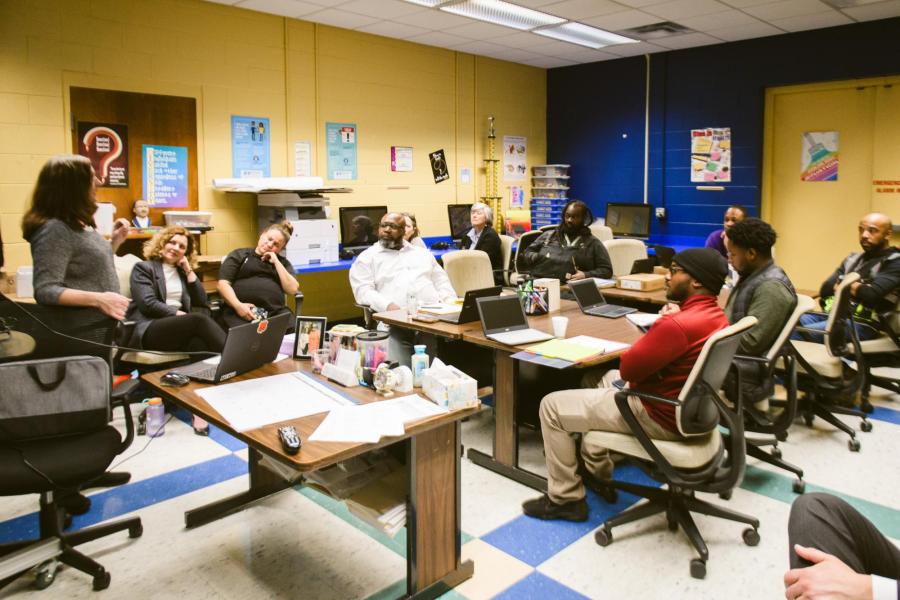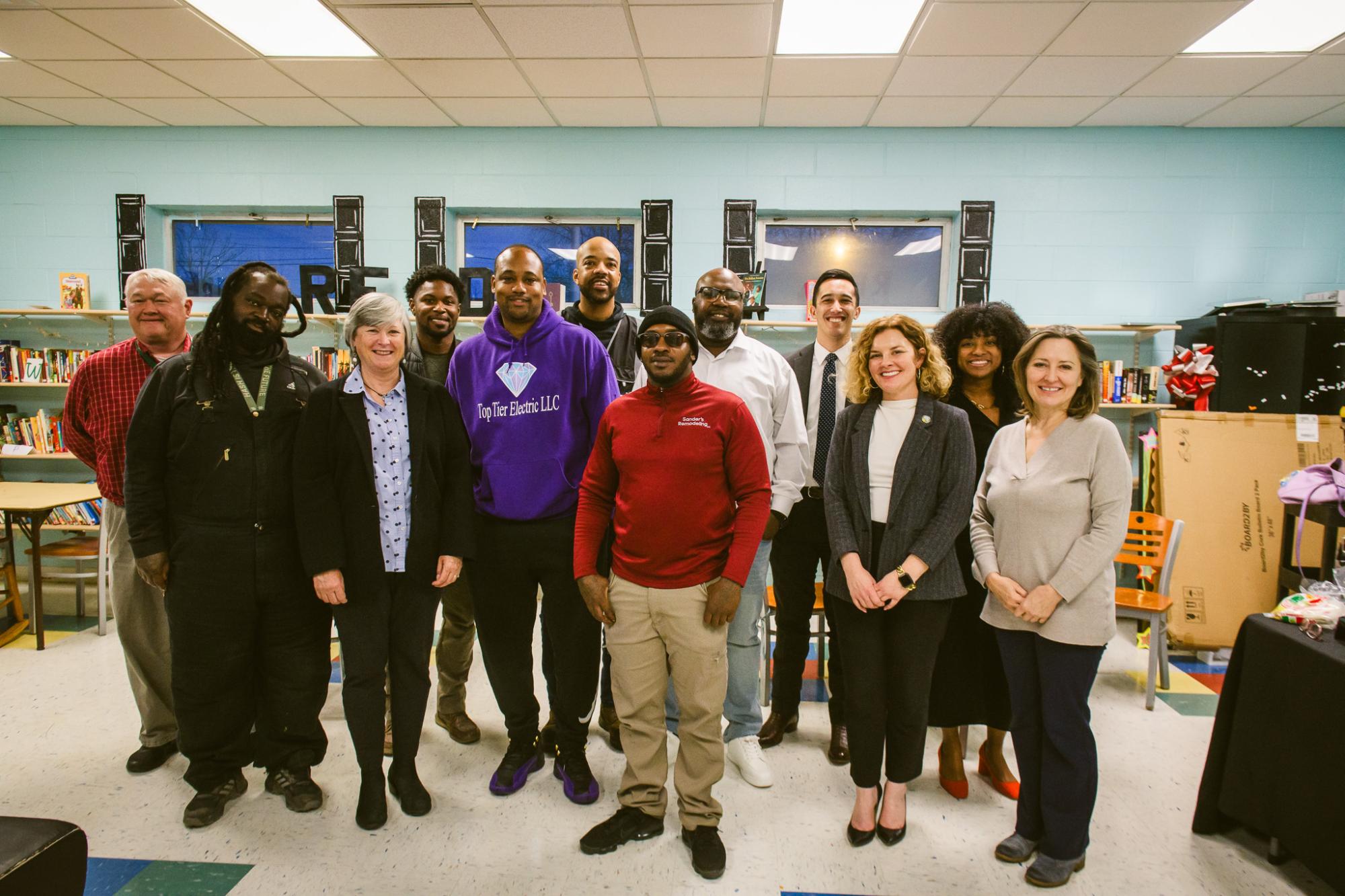Chattanooga Builder's Blueprint program aims to create contractor pipeline

By KATE COIL
TT&C Assistant Editor
A new program in Chattanooga hopes to aid groups that have traditionally faced barriers to careers in general contracting with the ultimate goal of expanding the local base of contractors and spurring reinvestment in the city.
The Builder’s Blueprint Program recently welcomed its first cohort and will help participants meet the qualifications needed for a general contractor license over eight weeks. Tennessee requires general contractor license applicants to prove a net worth of 10% of the project cost for which they are applying. For example, if someone is applying for a contracting license with a total monetary limit of $100,000, they must prove they have access to $10,000 in capital. This is difficult for many applicants, especially those from historically disadvantaged backgrounds.

“We can’t change the rules, but we can make them easier to navigate,” said Chattanooga Mayor Tim Kelly. “The Builder’s Blueprint Program is directly supportive of our mission to increase the diversity of contractors and vendors that are able to do business in and with the city and to make it easier for them to do so, creating critically needed economic opportunities for our minority community.”
By signing up for the Builder’s Blueprint Program, participants get financial counseling, access to necessary capital via a grant through the National League of Cities and the Community Foundation of Greater Chattanooga, and a laptop computer, business management tools, mentorship, networking opportunities, and more. Other important sponsors of the program include the Southern Cities for Economic Inclusion (SCEI) initiative, Pathway Lending, and Tech Goes Home.
The need for the program came to the attention of city officials and Mayor Kelly from working with Theodore Sanders, a current member of the program and owner of Sanders Remodeling.
“The Builders Blueprint program is opening doors and giving me the tools to take my business to the next level, creating generational wealth that will put my family in a position I have worked so hard for but always felt just out of reach,” said Sanders. “Through this program, I can get the assistance I need to succeed and contribute to building a stronger city - this is the hand-up that will change the lives of all of us who go through the program.”
Dylan Rivera, director of policy Planning and implementation for Chattanooga, said Sanders helped city officials better understand what barriers he and others were facing.
“Theo and I had become very close over the past few years, and I would talk with him about his business,” Rivera said. “I asked him what was the root cause of the problems he was running into with his business, and it was because he was operating as a subcontractor, not a fully-licensed general contractor. As I started to research and learn more, I started to understand more of what the problems were. We also had a cohort of city staff who were working with NLC in the Southern Cities Economic Inclusion Initiative, which is to diversify procurement practices for the city. We were able to see that in order to diversify our procurement contractors, there needed to be someone there to support that level of access. It was very clear that we were putting the cart before the horse.”
Because Builder’s Blueprint was started through the city, Rivera said Chattanooga was able to call on various partners and initiatives the city was already involved in. The first cohort of the pilot program has five participants based on grant funding for the program. There are still open applications online for the program, but said word-of-mouth has led to an additional 15 to 20 applicants with many of the current participants themselves encouraging others to look into future cohorts.
Rivera said that one of the financial challenges to the need for $10,000 on hand is that many people hoping to become general contractors don’t have the money at hand but rather tied up in their current business.
“There are so many subcontractors who hit every professional box, but that $10,000 is what keeping them from getting to that next level," he said. "That is what this program does. It provides them to that additional access to capital and the ability to scale up their businesses to what works best for them. That $10,000 can then grow as much as possible. The driving goal for this is to create generational wealth for a section of our community that has not traditionally had that.”
Additionally, Rivera said the application process to become a general contractor is “confusing” and “complicated” and there are a lot of myths in the contracting community about the process that must be dispelled. While there are many who have the skill set and knowledge needed to become general contractors, the lack of cash and the application process keep them from becoming officially licensed. Having the financial literacy needed to run a business is also an important focus.
Tech Goes Home has provided Chromebooks for all participants, which Rivera said is increasingly important in a world where contractors are expected to submit digital copies of bids and proposals. Without this access to technology, contractors often aren’t considered for larger projects. Providing mentorship will also give new contractors connections to reach out to for advice, ideas, and support.

Rivera said the process has helped him and other city officials see the struggles some Chattanoogans face.
“I think it’s really eye-opening to see how some of these men with criminal records have to navigate the system,” he said. “It further brings out more inequities that are in places you never expected them to be. When you aren’t interacting with people on a personal level, you aren’t exposed to how challenging things can be to navigate. It has been sobering to hear how things really are for them. It gives us a level of perspective that is incredible and helps ground the work we do in all our departments. The programs and initiatives you are launching have to fit in with people’s lived reality.”
Allowing a diversity of contractors will help Chattanooga as the city continues to grow.
“There is a shortage of general contractors statewide, and especially a shortage of minority general contractors,” he said. “When you look at the level of growth that is occurring in the Greater Chattanooga area and our need for affordable housing and the large-scale buildings that are going up, we want every to diversify who they are contracting with for those developments. For us, there is a huge market need that is only growing as we expand. For us to be able to prepare and bring up parts of our community so our residents can actually participate from and benefit in that growth, you have to provide assistance to help them from getting over those hurdles. They are very, very capable.”
By growing a base of contractors from traditionally underserved communities, Rivera said these contractors can then in turn help bolster the parts of Chattanooga they come from.
“Right now, we also have a shortage of general contractors willing to work with our nonprofits, to do remediation to keep housing online, or build the types of affordable housing we need,” he said. “There is no one better to do that work than people who already live in the neighborhoods these projects will serve. They know the neighborhoods and the community, because they come from them. It makes total sense to have them build the housing Chattanooga most needs. We are putting development dollars right back into the local economy and are building housing types that people throughout our city needed the most. There is also a sense of pride there. You take an extra level of career and attention to detail if you know the person who is going to move in.”
